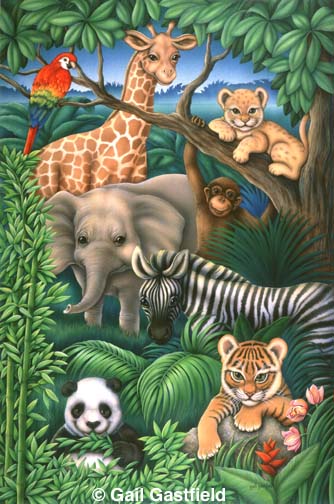
Imagine viewing earth from space - a tiny blue planet - incredibly beautiful! But look closely - to an increasing number of earth's creatures, life is not so pretty but simply a struggle to survive. Overpopulation by one species - Homo sapiens - has put many others at great risk. The Nature Conservancy estimates that, of U.S. species tracked by their databases, 22% of all vertebrates and 31% of all plants may be designated rare or endangered. But the most severely affected are invertebrates - such as crayfish - of which 63% are in peril. Severe deforestation is occurring in many third world countries - India, Pakistan and the rainforest countries of South and Central America. Human excess impinges on wildlife everywhere.


Alert birds to large expanses of glass in your home, such as patio doors or picture windows, by hanging streamers, putting bird silhouettes on the glass surface, or allow the glass to be a little bit dirty. Reducing the reflection should cut down on the number of birds who collide, often fatally, with windows and doors.
Educate children to respect and care for all wild creatures and their habitats. Children need to learn that wild animals are not playthings and should be allowed to go about their lives unmolested. Children should also be told not to destroy nests, burrows and other wildlife homes.
Pick up litter and refuse that could harm wildlife, including six-pack connectors (after cutting each circle to reduce the risk of entanglement), monofilament fishing line, and watch batteries (if consumed by waterfowl they can cause mercury poisoning).
Be alert when driving, especially near wildlife refuges and in rural areas, to avoid hitting or running over wild creatures. Animals do not recognize the danger from an oncoming vehicle. And please stop and move any turtles away from the roadway or shoulder of the road.
As a general rule, leave infant wildlife alone, since they are not always truly orphaned. A parent may be nearby or will return soon. Be sure they are in need of help before you remove them from the nest area. If you find young birds on the ground, attempt to return them to the nest.
Place caps over all chimneys and vents on your roof to prevent birds, ducks and raccoons from taking up residence and becoming a nuisance or getting trapped.
Do not leave fishing line or fish hooks unattended or lying about outdoors. Try to retrieve any kite string left on the ground or entangled in trees.
Before mowing your lawn or rototilling your garden, walk through the area first to make sure no rabbits or ground-nesting birds are in harms way. Remember, it only takes a couple weeks for these babies to grow and leave the nest. Be tolerant and give them the time they need.
Check trees to make sure there are no active nests or residents of cavities before cutting them down. Even better, avoid cutting down dead trees if they pose no safety hazard, since they provide homes for a wide variety of wildlife.
Use non-toxic products on your lawn and garden.
Motor oil should not be left in oil pans unattended. Birds often fall into these pans and few survive.
Do not attempt to raise or keep wildlife yourself.
Not only is it illegal, but wild creatures do not
make good pets and captivity poses a constant stress
to them. Young wild animals raised without contact
with their own species fail to develop survival
skills and fear of humans, virtually eliminating
their chances of survival in the wild.

Any good that I can do, or any kindness that I can show to any fellow creature, let me do it now - for I shall not pass this way again. ~~~~~*William Penn*~~~~
Sign My Guestbook
![]()
View My Guestbook


